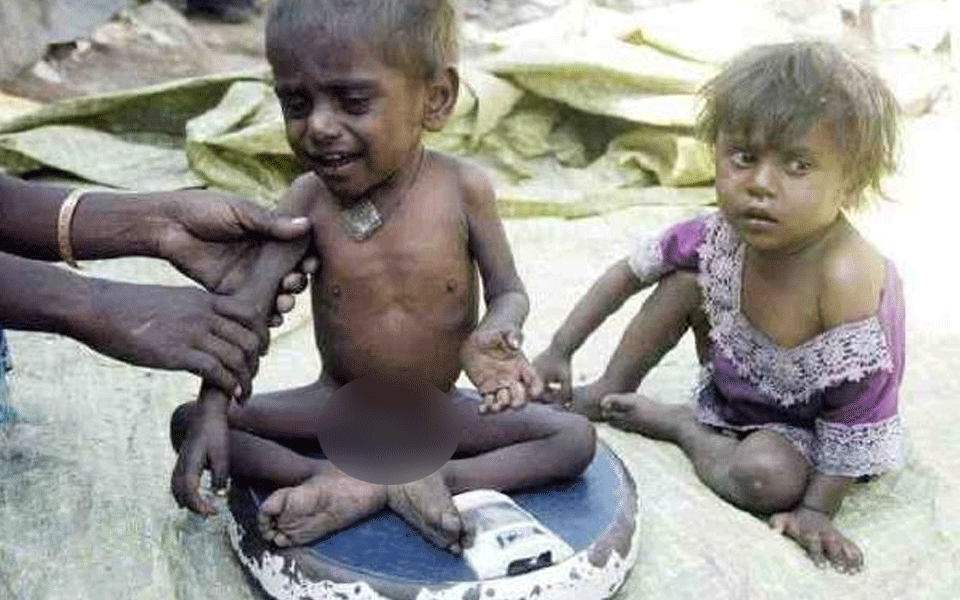They have extremely low weight for their height; the only country with a higher prevalence of child wasting is war-torn South Sudan.
At least one in five Indian children under the age of five are wasted, which means they have extremely low weight for their height, reflecting acute under-nutrition, according to the Global Hunger Index 2018. The only country with a higher prevalence of child wasting is the war-torn nation of South Sudan, says the report, which was released on Thursday.
Overall, India has been ranked at 103 out of 119 countries in the Index, with hunger levels in the country categorised as “serious”. India’s ranking has dropped three places from last year, although the Index says its results are not accurately comparable from year to year and instead provides a few reference years for comparable data. The 2018 scores reflect data from 2013-2017.
Four main indicators are used to calculate hunger levels in the report, which is a peer-reviewed publication released annually by Welthungerhilfe and Concern Worldwide. (The International Food Policy Research Institute was also involved with the publication until this year.)
The first indicator is undernourishment, which is the share of the population which is undernourished and reflects insufficient caloric intake. The next three indicators use data for children under five: child wasting (low weight for height), reflecting acute under-nutrition; child stunting (low height for age), reflecting chronic under-nutrition; and child mortality.
India has shown improvement in three of the indicators over the comparable reference years. The percentage of undernourished people in the population has dropped from 18.2% in 2000 to 14.8% in 2018. The child mortality rate has halved from 9.2% to 4.3%, while child stunting has dropped from 54.2% to 38.4% over the same period.
However, the prevalence of child wasting has actually worsened in comparison to previous reference years. It stood at 17.1% in 2000, and increased to 20% in 2005. In 2018, it stands at 21%. South Sudan’s child wasting prevalence is at 28%.
Child wasting is high across South Asia, constituting a “critical public health emergency”, according to UN organisations. The report notes that wasting rates are highest for infants aged 0 to 5 months, suggesting that attention to birth outcomes and breastfeeding is important.
Also, child wasting in the region is associated with a low maternal body mass index, suggesting the need for a focus on the nutritional status of the mother during pregnancy.
The report notes that in South Asia, “maternal BMI and access to improved water and sanitation are more closely associated with rates of child wasting than household wealth, suggesting that a reduction in poverty alone may not be sufficient to correct the problem…Factors that could reduce child stunting in South Asia include increased consumption of non-staple foods, access to sanitation, women’s education, access to safe water, gender equality, and national food availability.”
Globally, the level of hunger still falls into the “serious” category, despite improvement over the last two decades. The Index projects that at the current rate of progress, 50 countries will fail to reach the “low” hunger category by 2030. This puts the UN’s Sustainable Development Goal 2, which aims to end hunger by 2030, in jeopardy, says the report.
Courtesy: www.thehindu.com
Let the Truth be known. If you read VB and like VB, please be a VB Supporter and Help us deliver the Truth to one and all.
Ottawa (PTI): Three Indian nationals have been arrested by Canadian police on an anti-extortion patrol and charged after bullets were fired at a home.
Harjot Singh (21), Taranveer Singh (19) and Dayajeet Singh Billing (21) face one count each of discharging a firearm, and all have been remanded in custody until Thursday, the Surrey Police Service (SPS) said in a statement on Monday.
The suspects were arrested by patrol officers after an early morning report of shots fired and a small fire outside a home in Surrey's Crescent Beach neighbourhood, the LakelandToday reported.
On February 1, 2026, the SPS members were patrolling in Surrey’s Crescent Beach neighbourhood when reports came in of shots being fired and a small fire outside a residence near Crescent Road and 132 Street.
The three accused were arrested by SPS officers a short time later, the statement said.
SPS’s Major Crime Section took over the investigation, and the three men have now been charged with Criminal Code offences, it said.
All three have been charged with one count each of discharging a firearm into a place contrary to section 244.2(1)(a) of the Criminal Code.
The investigation is ongoing, and additional charges may be forthcoming. All three have been remanded in custody until February 5, 2026.
The SPS has confirmed they are all foreign nationals and has engaged the Canada Border Services Agency, it said.
One of the suspects suffered injuries, including two black eyes, the media report said.
Surrey police Staff Sgt. Lindsey Houghton said on Monday that the suspect had refused to comply with instructions to get out of the ride-share vehicle and started to "actively resist."
"As we were trained, he was taken to the ground and safely handcuffed," said Houghton.
A second suspect with a black eye was also injured in the arrest after refusing to comply, Houghton said.
The arresting officers were part of Project Assurance, an initiative that patrols neighbourhoods that have been targeted by extortion violence.
Houghton said the Canada Border Services Agency (CBSA) is also involved because the men are foreign nationals, and the trio may face additional charges.
It's not clear if the men are in the country on tourist visas, a study permit, or a work permit, but Houghton said CBSA has started its own investigation into the men's status.
Surrey has seen a number of shootings at homes and businesses over the last several months, but there's been an escalation since the new year.





